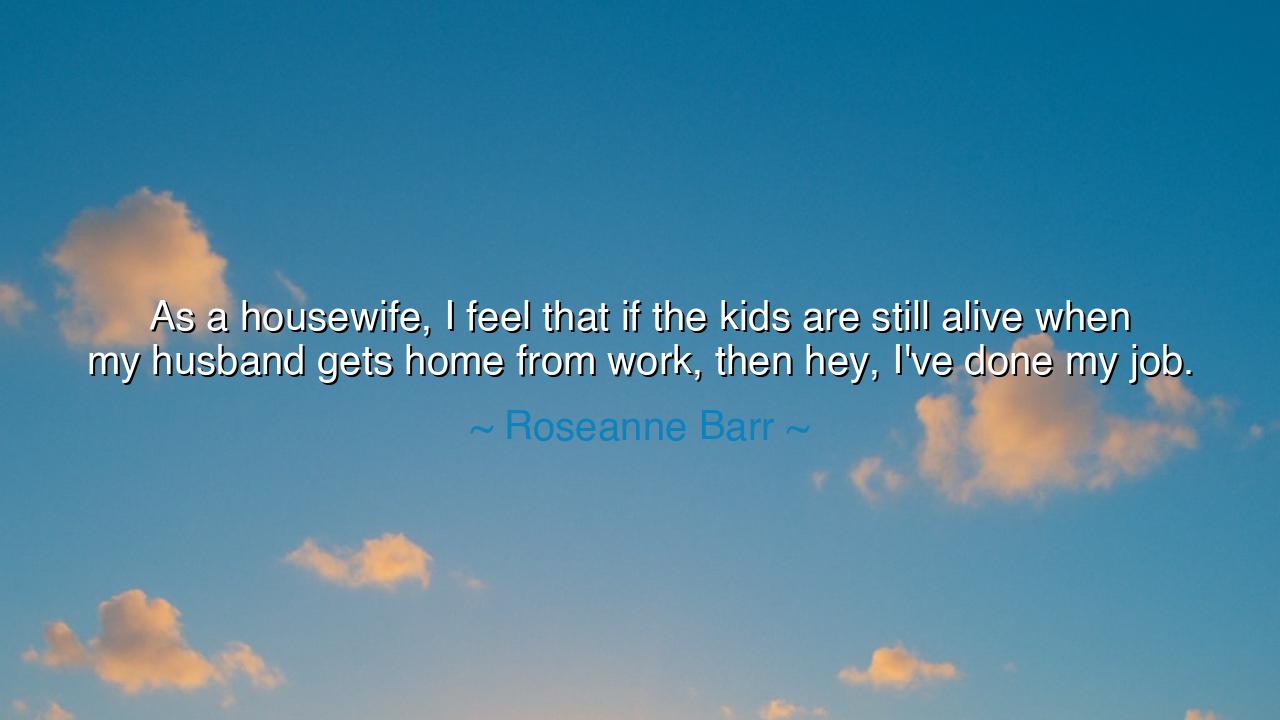
As a housewife, I feel that if the kids are still alive when my
As a housewife, I feel that if the kids are still alive when my husband gets home from work, then hey, I've done my job.






The words of Roseanne Barr, when she quipped, “As a housewife, I feel that if the kids are still alive when my husband gets home from work, then hey, I’ve done my job,” seem at first to be a jest — a burst of humor from a comedian known for her wit. Yet beneath the laughter lies a truth both timeless and profound: that the burdens of domestic life, though often invisible, are as real and demanding as any labor under the sun. Through her irony, Roseanne speaks for every soul who has borne the weight of care, exhaustion, and unacknowledged effort. She transforms fatigue into comedy, but behind the smile, there stands a quiet heroism.
In ancient times, the hearth was the heart of the home — sacred, warm, eternal. To tend it was the task of women, but also of priests, for fire was holy and its keeping a solemn trust. The goddess Hestia in Greece, or Vesta in Rome, symbolized this eternal flame — the spirit of domestic life, where love and survival were intertwined. The housewife, then, was not merely a servant of the home, but its guardian, its unseen pillar. Roseanne’s words carry the echo of this truth. Beneath her laughter is the wisdom of millennia: that to keep life steady, to keep children safe, and to endure another day of chaos and noise is, in its own way, a sacred victory.
Her humor comes from the clash between expectation and reality. The world often paints motherhood and housework in colors of serenity — smiling mothers, spotless kitchens, obedient children. But the real world is fire and fatigue: spilled milk, tantrums, endless repetition. The quote pierces through this illusion. “If the kids are still alive,” she says — a playful exaggeration that reveals how survival itself can be triumph. In her jest, she reclaims dignity for the overworked and unseen, saying that even the simplest achievements, born of patience and perseverance, are worthy of honor.
Consider the story of Abigail Adams, wife of John Adams, who raised children and managed a farm while her husband helped build a nation. Her letters, written by candlelight, speak of toil and loneliness, yet also of fierce pride in her endurance. She did not march in armies or draft laws, yet her labor sustained those who did. Like Roseanne, she understood that greatness often hides behind ordinary acts — that holding a family together is its own kind of warfare, fought not with swords, but with love, laughter, and unyielding will.
Roseanne’s words also carry a deeper message about self-worth and imperfection. They whisper to all who labor unseen: You are enough. The perfection that society demands — spotless homes, smiling faces, obedient children — is a fantasy. Real life is messy, and yet beauty thrives amid the mess. The ancients knew this too. When the Japanese speak of wabi-sabi, the beauty of imperfection, they honor the cracks that make something human. Roseanne, in her own earthy way, reminds us that life’s value lies not in flawlessness, but in endurance and humor — the power to laugh and say, “I made it through another day.”
And so her quote, though playful, becomes a testament of resilience. It teaches that the measure of success is not grandeur, but persistence — not applause, but survival. The one who keeps going, who keeps loving through exhaustion, who faces chaos with humor, performs a quiet miracle each day. To laugh at hardship is to rob it of its power; to endure it with love is to become strong as stone.
Let this then be the lesson passed down to future generations: honor the unseen laborers — the mothers, fathers, caregivers, and humble workers who hold the world together through small, daily acts. Their victories may not shine in the chronicles of history, but they echo in the laughter of children and the warmth of homes. And when the day grows long and weary, let them remember Roseanne’s wisdom: that survival, done with love and humor, is not mere endurance — it is greatness itself.
For in the end, to keep the fire burning, to keep the children alive and the spirit unbroken — that is the quiet triumph of the human heart. And as the ancients would have said, such triumph is worthy not of mockery, but of reverence. In the smallest acts of care lies the mightiest courage.






AAdministratorAdministrator
Welcome, honored guests. Please leave a comment, we will respond soon